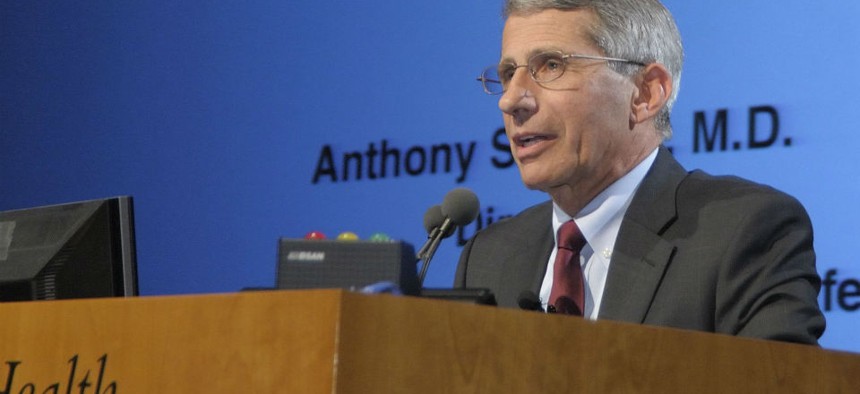
Dr. Anthony Fauci NIAID file photo
'An Epidemic of Fear': Ebola in the United States
National Institute of Allergy and Infectious Diseases director Anthony Fauci's lessons from three decades of public health crises.
In his three decades at the helm of the National Institute of Allergy and Infectious Diseases (NIAID), Anthony Fauci has seen more than three major public health crises, including the beginning of the HIV/AIDS epidemic in the United States, the anthrax attacks that followed 9/11, and today's Ebola epidemic ravaging West Africa and stoking anxiety about its possible spread in the U.S.
At the Washington Ideas Forum on Thursday, The New York Times' David Brooks asked him how those previous crises compare to today's.
"I think what we're seeing is a catastrophic health crisis in West Africa, and an epidemic of fear here," Fauci said. "I don't disrespect that fear, and I don't criticize it. But you've got to evaluate your risk and relative risk based on scientific evidence." He emphasized that two people have so far gotten infected with Ebola while in the United States. "That doesn't mean there might be other infections. There might be. I don't know. But look at what's happened and the fear that it's generated."
Fauci had just taken over NIAID as the HIV/AIDS crisis was beginning in the United States in the 1980s, and the reaction to that pandemic was in some sense the reverse of the fear with which Ebola has been greeted in the U.S. In that case, he said, "there was the emergence of a phenomenal, historic pandemic that dwarfs anything else. And there was in some quarters not a lot of attention paid to it."
By contrast, the 2001 anthrax attacks—in which five Americans died and 17 got sick—sparked a nationwide fear of opening mail, Fauci said. "That was a bit unrealistic."
But whether overblown or entirely too mild, fear is a factor public health officials have to consider as part of the job of responding to disease. "You have to respect the fear of people," Fauci said. "You can't denigrate it and say, 'Why are you afraid?' You've got to try and explain to them."







